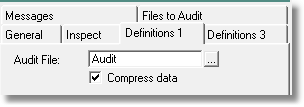"Definitions 1" Tab - Basic Settings
You have to specify the following in the main app, or in a multi-dll system, you have to specify it in the data dll app and you have to specify it in the app where you will use the ViewRecord control template (these can be the same app).

Audit File: First, you have to specify the name of your Audit file. This is the file where the audit operations are going to be recorded. In our example DCT it is the file called Audit.
Compress data: Below the Audit file name, you have to specify whether the audit data will be compressed. If you don't activate this option, the audit data will be stored in uncompressed format (as it was up to version 1.33 of FullRecord), and the template will work exactly as in versions before version 1.50.
If you choose to activate this option, all the audit data will be compressed before it is saved to file, and it will be decompressed after reading it from file.
Note: To activate this option, if all your audited records are very small (less than 40 bytes), may in fact produce bigger files due to the compression overheads. Compression is only a viable option when the record is bigger than 40 bytes. The bigger the record is, the “better” the compression result will be.
"Definitions 1" Tab - Advanced Settings

Zlib already declared: If you own another product that uses zlib as compression library, you might get duplicate declarations in your global map and project, so to avoid that tick this check box or disable the zlib library declaration in the other 3rd party product.
GetComputerName already declared: If you own another product that define the GetComputerName API, you might get duplicate declarations in your global map. To avoid such a situation tick this checkbox.
Compression Flag: After the "Compress data" option you will see a "Compression Flag" variable. We strongly advise you to define this variable in your Audit file if you are going to use compression, although is not mandatory. If you leave this field empty while the "compress data" option is activated, the audit data will always be decompressed after reading and compressed prior to saving.
Note: Omitting this variable could lead to severe problems if you decide to change the status of the "Compress data" at some stage, as you might end up with compressed and uncompressed data mixed in the Audit file, and you won't be able to inspect data that isn’t in the same state as the global option. Using the "Compression flag", each record in the audit file will be identified as compressed or not, and the template will read them as such. By using this flag, the template will also be able to change the compression status of the records as and when required.

Suffixes for New and Backup Audit files: You have to specify suffixes to create two files that are identical to the audit file. You should take extra care making sure that these two files stay in sync with the Audit file. The name of these files must be the name of the Audit file plus a suffix. In FullRecord’s example, the Audit file is named AUDIT and the other two files should be named AUDITNEW and AUDITBCK. These three files have to be identical, although in a SQL environment the External Key names should be different to avoid problems with the SQL engine.
You can define these files as an ALIAS of the Audit file, although this is not automatically supported by FullRecord. While this is perfectly valid, it adds the complexity of having to manage the file names just before opening them, on each procedure. This exceeds the scope of FullRecord, which doesn't deal with that.

If Audit file is BTRIEVE, remove garbage from memo fields: Due to a bug in Clarion, if you use Btrieve files to store the Audit information the "memo" fields may be saved with some some “garbage” characters at the start of the memo field. When you tick this checkbox, FullRecord will attempt to clean the memo information before being saved to file.